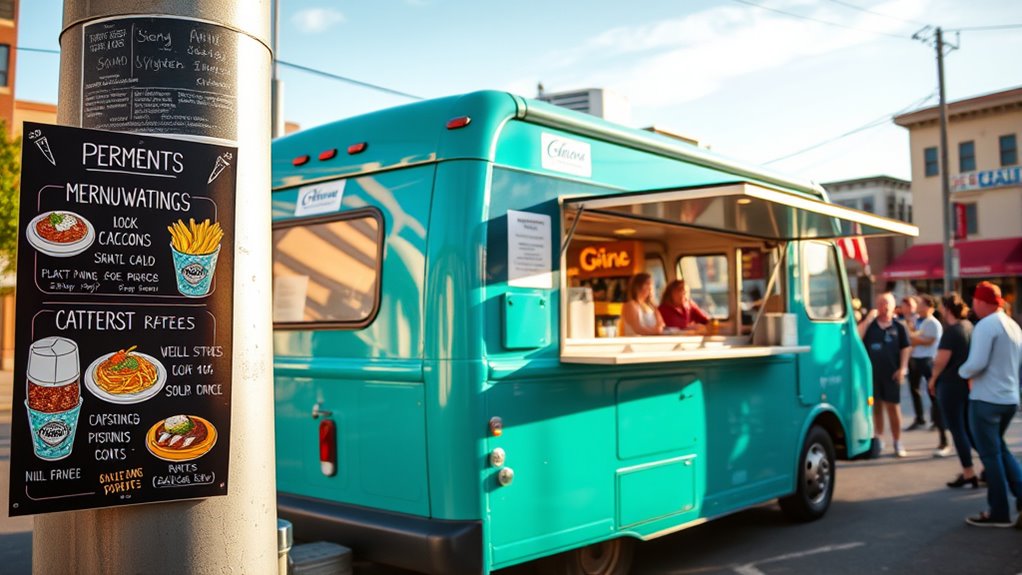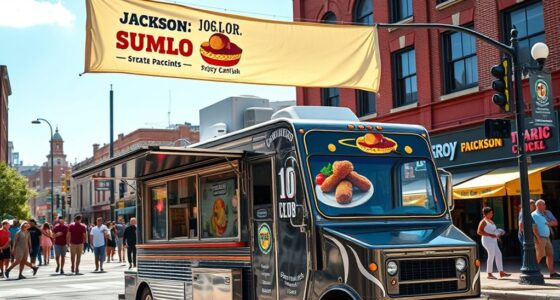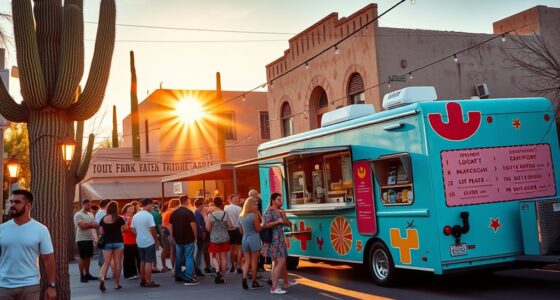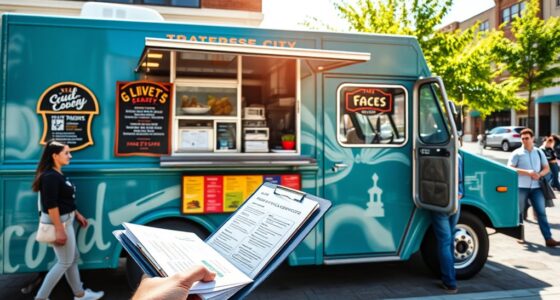To launch a food truck in Tacoma, you need to obtain several permits, including a City Food Truck License and health department permits, which can cost around $225 to over $800 annually. Securing locations requires site agreements with property owners, ensuring restroom access and safety standards. Budget for costs like insurance, inspections, and licensing. Planning your menu within limited space and adopting smart marketing strategies like social media can boost your success. Keep exploring to discover detailed steps for each aspect.
Key Takeaways
- Obtain necessary permits including a City Food Truck License, health department permits, and vehicle inspections to ensure compliance.
- Budget for application fees ($368–$817), insurance ($3,500–$5,500 annually), and renewal costs to plan your startup expenses.
- Secure prime locations by negotiating site agreements, ensuring restroom access within 500 feet, and considering customer flow.
- Design a manageable menu focusing on signature dishes, seasonal ingredients, and effective marketing through social media and local events.
- Maintain safety standards with routine health and fire inspections, proper waste management, and adequate insurance coverage for smooth operations.
Navigating Permits and Licensing Requirements in Tacoma
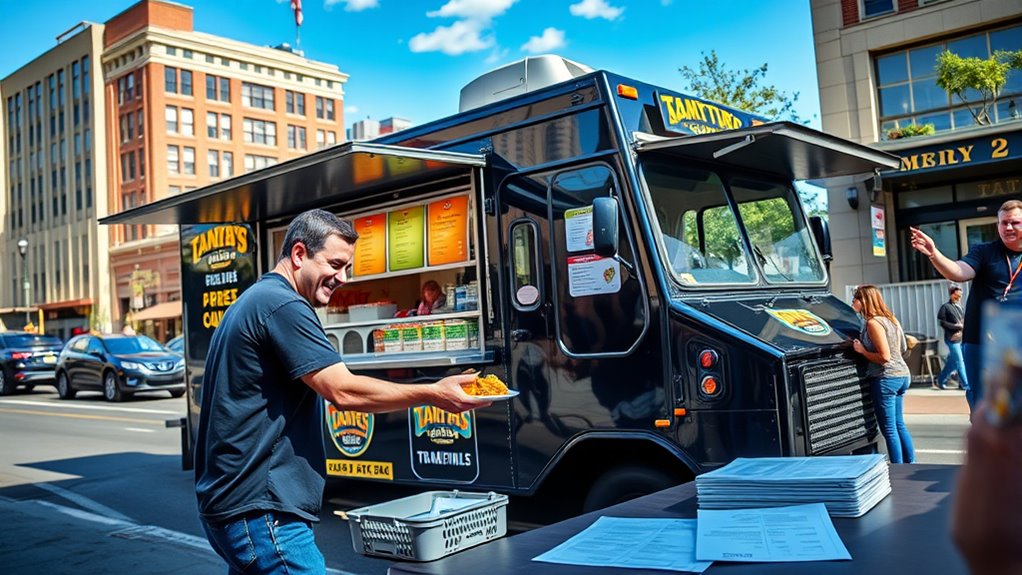
Navigating permits and licensing in Tacoma can seem complex, but understanding the key requirements will help you get your food truck up and running smoothly. First, you need a City Food Truck License, which is specific to mobile food trucks operating within city limits. To qualify, you must hold a valid Tacoma-Pierce County Health Department (TPCHD) Mobile Unit Permit, along with commercial liability insurance and approved Sales Site Agreements. Your vehicle must pass an inspection by Tacoma’s Fire Department before licensing. This license is in addition to your annual Tacoma Business License and Health Department permit. Applications are handled by the City of Tacoma Tax & License Office. Ensuring you meet these requirements early will make the licensing process more straightforward and help you start serving customers sooner. Additionally, you may need to undergo periodic inspections to maintain compliance with local health and safety standards, including regulatory compliance and adherence to local health codes.
Understanding Costs and Fees for Food Truck Operations
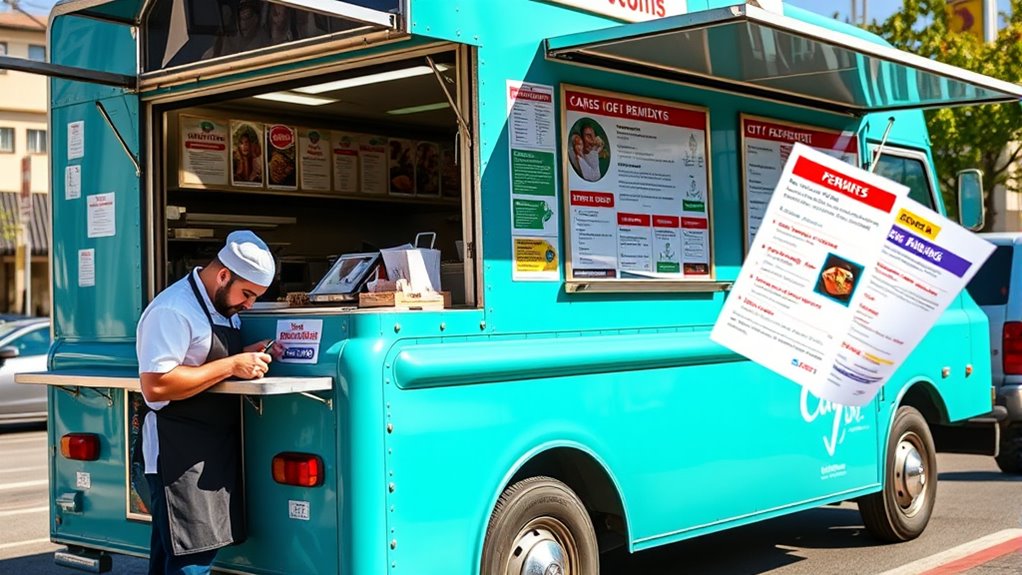
To run a food truck in Tacoma, you need to understand the costs involved in permits, insurance, and inspections. These fees can add up quickly and vary depending on your specific operations. Being aware of these expenses helps you plan your budget and stay compliant from the start. Permits and licensing fees can range significantly based on local regulations, and neglecting proper licensing can lead to costly fines or shutdowns. Additionally, understanding the costs associated with permits can help you better estimate your overall startup expenses and avoid surprises down the line.
Permit Application Fees
Understanding permit application fees is essential for planning your food truck business in Tacoma. Fees vary depending on permit type and risk level. The Mobile Food Unit permit costs between $368 (low risk) and $817 (high risk). The City of Tacoma Food Truck License is an additional $225, required along with the health permit. Temporary permits have separate fees and late penalties, while a home-based business may need a $75 Home Occupation license. Fees depend on food risk classification, site agreements, inspections, and potential insurance costs. Renewal fees are required annually. Keep in mind that permit costs can increase with site-specific requirements or delays. Additionally, understanding Home Improvement regulations can help ensure your business complies with local standards and avoids unnecessary fines.
Insurance Expenses Overview
Insurance expenses are a critical part of operating a food truck in Washington, as they help protect your business against common risks and liabilities. You’ll need minimum auto liability coverage of $25,000 per person, $50,000 per accident, and $10,000 property damage, though many trucks opt for higher limits like $1 million. If you have employees, workers’ compensation insurance is mandatory, with voluntary options for owners to cover injuries. Some counties also require a $1,000 health department bond, ensuring compliance. On average, expect to pay around $3,500 to $5,500 annually for coverage, including a business owner’s policy averaging about $84 per month. Costs vary based on factors like location, vehicle type, coverage levels, and whether you serve alcohol. Understanding dream symbols related to risk or protection can offer additional insights into your business journey.
Inspection and Compliance Costs
Operating a food truck in Tacoma requires maneuvering a range of inspection and compliance costs that can impact your budget. You’ll need a Mobile Unit Permit from the Tacoma-Pierce County Health Department, costing around $276 to $621 annually, plus about $230 for pre-opening inspections. Washington State charges a $51.80 inspection fee for your truck’s insignia. If issues arise, reinspection fees are approximately $230 per visit, with follow-up inspections costing $230 each and probation inspections about $460. You might also face additional charges for expedited reviews or administrative conferences, which can reach up to $828 per event. Operating without proper permits or inspections risks penalties, administrative fees, or even closure, making compliance costs an essential part of your budget planning. As with trustworthiness of Patchology, ensuring all regulatory requirements are met is vital to maintaining credibility and smooth operation of your food truck business.
Choosing and Securing Prime Food Truck Locations
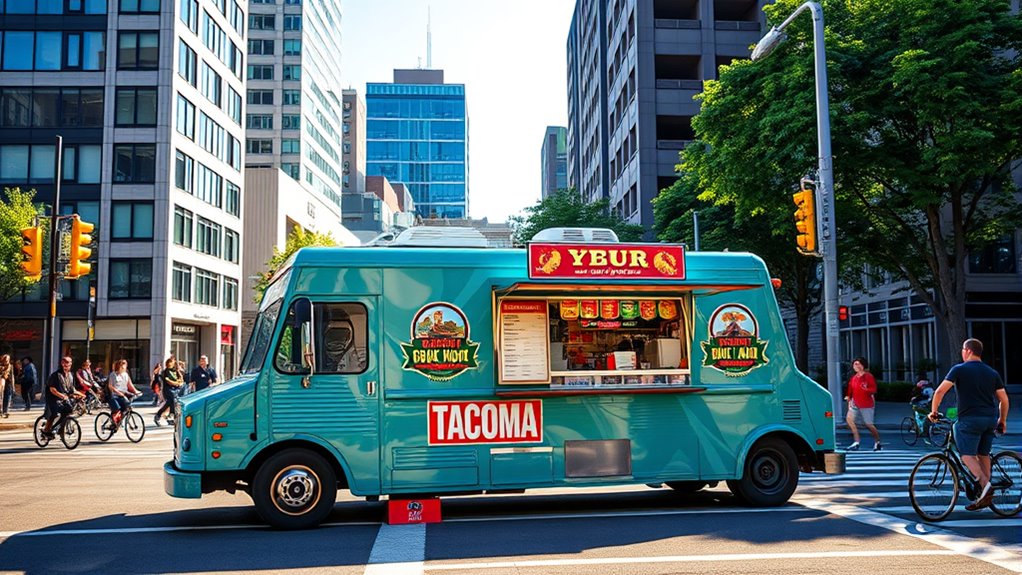
Securing prime food truck locations in Tacoma often means negotiating site agreements directly with property owners or event organizers. You’ll also need to guarantee restroom access is available for your staff and comply with local health and safety rules. Focusing on these factors helps you establish a consistent, legal spot that attracts steady customer traffic. Eco-friendly power solutions, like portable solar panels, can also enhance your operational sustainability and appeal to environmentally conscious customers. Tacoma’s vibrant neighborhoods and weekly food truck rotations provide excellent opportunities to reach a diverse customer base and build a loyal following.
Site Agreement Strategies
Choosing the right site agreement is essential for establishing a successful food truck operation in Tacoma. Your success depends on securing prime locations through strategic partnerships and clear agreements. Partner with property owners for consistent weekly or seasonal spots, ensuring stability and customer loyalty. Coordinate with city or port authorities like the Port of Tacoma to access public venues legally. Clarify utilities, waste disposal, and health compliance to prevent disruptions. Balance space and parking needs for peak customer volume without blocking traffic or pedestrians. Given that Tacoma has over 2 unique taco trucks and several dessert and BBQ vendors, securing a high-traffic location can significantly boost visibility and sales for your food truck by attracting the same crowds that frequent popular vendors. Establishing a strong location strategy can make all the difference in building a loyal customer base and maximizing your profits.
Restroom Access Requirements
Have you considered how restroom access can impact your food truck’s location choices in Tacoma? The city requires a plumbed restroom with hot and cold water within 500 feet during operating hours. This proximity influences where you can park, especially if you offer customer seating or expect high foot traffic. You’ll need approval from property owners and to identify available restrooms in your Sales Site Agreement with the Tacoma-Pierce County Health Department. Restrooms must meet health standards, be fully operational, and accessible for both staff and customers when applicable. Use the table below to compare potential sites based on restroom access:
| Location | Distance to Restroom | Accessibility | Notes |
|---|---|---|---|
| Downtown Park | 300 ft | Fully accessible | Ideal for high traffic |
| Shopping Center | 600 ft | Partially accessible | Needs approval |
| Waterfront | 200 ft | Fully accessible | Limited seating |
| Industrial Zone | 700 ft | Not accessible | Not suitable |
| Community Plaza | 400 ft | Fully accessible | Good for events |
Proper restroom access ensures compliance and customer satisfaction. Additionally, understanding tea culture and traditions can enhance your customer experience by offering unique beverage options inspired by different regions.
Planning Your Menu Within Mobile Food Unit Constraints
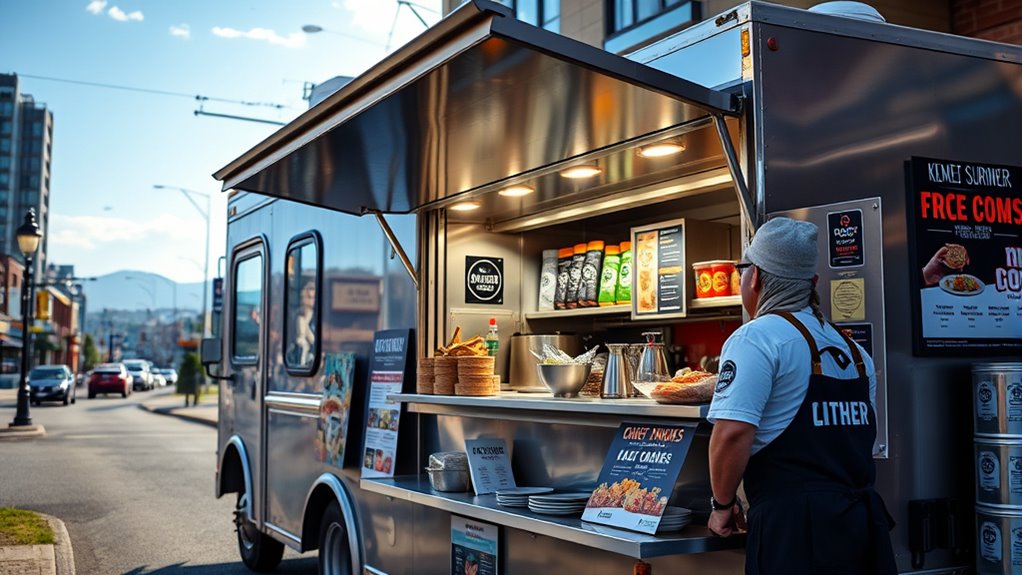
Planning your menu within a food truck’s constraints requires balancing limited space, equipment, and storage with customer expectations. You need to choose ingredients wisely, focusing on seasonal availability and sourcing from reliable vendors to guarantee freshness and cost efficiency. Storage limitations mean selecting ingredients with manageable shelf lives, and designing multiple dishes from a core set reduces waste. You can also incorporate Gold IRA principles of diversification and careful selection to inform your menu choices, helping to maximize appeal and profitability. Consider these key points: 1. Optimize ingredient choices to match seasonal availability and regional sourcing challenges. 2. Select equipment carefully—your flat-top grill or fryer influences menu options. 3. Simplify your menu to focus on a few signature dishes for quick service. 4. Ensure flexibility to adapt to seasonal changes and health regulations without overcomplicating your offerings.
Effective Strategies for Marketing Your Food Truck Business
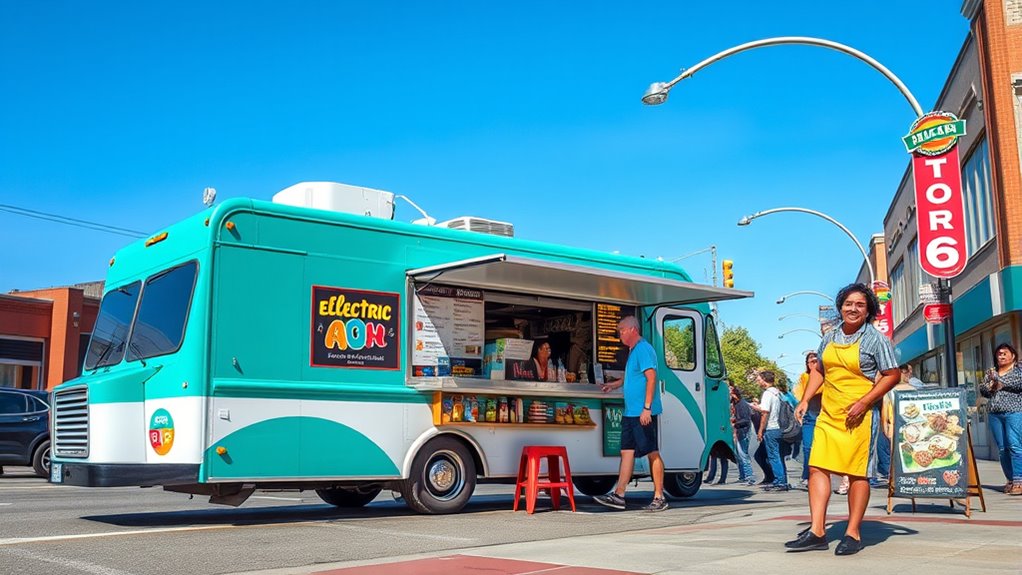
To effectively market your food truck business in Tacoma, leveraging social media is essential, as it allows you to reach a broad audience and build a loyal customer base. Facebook is the top platform, with 75% of food trucks actively engaging customers there, boosting sales by an average of 20%. Social media also increases customer spending by about 15%. Mobile apps for locating trucks saw a 35% rise in downloads, making it easier for customers to find you. Additionally, 40% of customers discover food trucks through targeted social media ads. Participating in local events and festivals further enhances visibility, attracting large crowds and fostering community relationships. Combining these strategies with email marketing, loyalty programs, and data analytics helps you tailor your marketing efforts for maximum impact. Digital presence and review responsiveness also play a critical role, as higher customer satisfaction and positive reviews can significantly boost your reputation and attract new patrons. Incorporating nutrient-rich content such as highlighting healthy juice options or fresh ingredients can further differentiate your truck and appeal to health-conscious customers.
Ensuring Safety and Compliance Through Regular Inspections

Maintaining safety and compliance is a vital part of operating a food truck in Tacoma. You’ll need regular inspections to stay on top of health, safety, and licensing standards. These inspections ensure your truck meets all requirements to keep your business running smoothly.
Ensuring safety and compliance keeps your Tacoma food truck operating smoothly and legally.
- Pass health and fire inspections to prevent hazards and protect your customers and staff.
- Maintain your Mobile Unit Permit by renewing annually and ensuring proper water and waste management.
- Secure adequate insurance coverage to avoid delays or license revocation.
- Comply with site and structural safety checks for electrical, plumbing, and propane systems to prevent accidents.
Frequently Asked Questions
How Long Does It Typically Take to Obtain All Necessary Permits in Tacoma?
You’re probably wondering how long it takes to get all the permits. Typically, it takes around 4 to 8 weeks, but delays can happen if your application is incomplete or if there’s high volume. You’ll need to coordinate between the city, health department, and LNI, which can add extra time. To speed things up, submit complete paperwork early and stay in touch with the agencies involved.
Are There Specific Zoning Restrictions for Food Trucks at Night or on Weekends?
Your curiosity about Tacoma’s zoning restrictions is like a compass guiding you through a maze of rules. Currently, there are no strict time-based bans for food trucks at night or on weekends, but you must stick to pre-approved zones or secure a Special Event Permit for outside hours. Keep an eye on local regulations, as future restrictions could emerge through public comment, shaping your night-time culinary journey.
Can I Operate in Multiple Cities With One License or Permit in Washington?
You can’t operate in multiple cities with just one license or permit in Washington. Each city requires its own licensing and permits, including health, fire, and business licenses. You’ll need to apply separately for each jurisdiction where you plan to operate, which can increase costs and administrative work. Make sure to check local regulations for vending locations and restrictions to stay compliant in each city.
What Are the Best Practices for Managing Waste and Water on a Mobile Food Unit?
You might wonder how to handle waste and water efficiently on your mobile food unit. The key is installing clearly labeled bins for landfill, recycling, and compost, and training staff to sort waste properly. Use secure lids, minimize waste with eco-friendly packaging, and encourage customer participation. Regularly clean and sanitize, prevent water contamination, and follow local regulations. Staying vigilant guarantees your truck stays eco-friendly, compliant, and ready for any challenge on the road.
How Can I Effectively Build a Loyal Customer Base Using Social Media?
To build a loyal customer base through social media, you should post high-quality photos, behind-the-scenes videos, and customer testimonials regularly. Engage with your audience by responding promptly to comments and messages, creating polls, and hosting contests. Keep followers updated on your truck’s location, specials, and events. Use hashtags and geo-tags to boost visibility, partner with local influencers, and promote loyalty programs to encourage repeat visits and community growth.
Conclusion
Starting your food truck journey in Tacoma is like planting a seed—nurture it with the right permits, costs, and locations. Your menu is the roots that anchor your brand, while marketing is the sunlight that helps it grow. Stay vigilant with inspections, like tending to your garden. With dedication, your truck will flourish, becoming a vibrant beacon on Tacoma’s streets—an enduring symbol of your passion and perseverance.
